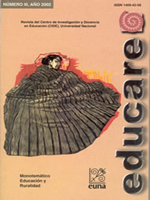Ruralidad y desarrollo en Costa Rica: fracturas, oportunidades y desafíos
DOI:
https://doi.org/10.15359/ree.2002-3.5Abstract
The objective of this article is to identify the main challenges of rural education in Costa Rica for the new millennium. This analysis is divided into four main themes: 1) the changing rural world, new theoretical and practical referents, 2) changes in the Costa Rican rural setting: a summary of the main tendencies; 3) changes in the rural world as seen in the perspective of regional dynamics; and 4) the challenges of the rural world and education. This work is based on research done by the author within the framework of the project known as State of the Nation in Sustainable Human Development.References
Ceña, F. (1993) El desarrollo rural en sentido amplio". En El desarrollo
rural Andaluz a las puertas del siglo XXI. Congresos y Jornadas, Andalucía, España, Nº 32.
Giarracca, N. (compiladora) (2001) ¿ Una nueva ruralidad en América latina?, CLACSO, Buenos Aires.
Pérez, E. (200 l) Hacia una nueva visión de lo rural. En ¿ Una nueva
ruralidad en América latina? CLACSO, Buenos Aires.
Proyecto Estado de la Nación, Estado de la Nación en Desarrollo Humano Sostenible, Tercer Informe, CONARE-PNUD-DEFENSORÍA DE LOS HABITANTES, San José, Costa Rica, 1997.
Proyecto Estado de la Nación, Estado de la Nación en Desarrollo Humano Sostenible, Cuarto Informe, CONARE-PNUD-DEFENSORÍA DE LOS HABITANTES, San José, Costa Rica, 1998.
Proyecto Estado de la Nació11, Estado de la Nación en Desarrollo Humano Sostenible, Sexto Informe, CONARE-PNUD-DEFENSORÍA DE LOS HABITANTES, San José, Costa Rica, 2000.
Proyecto Estado de la Nación, Estado de la Nación en Desarrollo Humano Sostenible, Sétimo Informe, CONARE-PNUD-DEFENSORÍA DE LOS HABITANTES, San José, Costa Rica, 2001.
Published
How to Cite
Issue
Section
License
1. In case the submitted paper is accepted for publication, the author(s) FREELY, COSTLESS, EXCLUSIVELY AND FOR AN INDEFINITE TERM transfer copyrights and patrimonial rights to Universidad Nacional (UNA, Costa Rica). For more details check the Originality Statement and Copyright Transfer Agreement
2. REUTILIZATION RIGHTS: UNA authorizes authors to use, for any purpose (among them selfarchiving or autoarchiving) and to publish in the Internet in any electronic site, the paper´'s final version, both approved and published (post print), as long as it is done with a non commercial purpose, does not generate derivates without previous consentment and recognizes both publisher's name and authorship.
3. The submission and possible publication of the paper in the Educare Electronic Journal is ruled by the Journal’s editorial policies, the institutional rules of Universidad Nacional and the laws of the Republic of Costa Rica. Additionally, any possible difference of opinion or future dispute shall be settled in accordance with the mechanisms of Alternative Dispute Resolution and the Costa Rican Jurisdiction.
4. In all cases, it is understood that the opinions issued are those of the authors and do not necessarily reflect the position and opinion of Educare, CIDE or Universidad Nacional, Costa Rica. It is also understood that, in the exercise of academic freedom, the authors have carried out a rogorous scientific-academic process of research, reflection and argumentation thar lays within the thematic scope of interest of the Journal.
5. The papers published by Educare Electronic Journal use a Creative Commons License:














 The articles published by Educare Electronic Journal can be shared with a Creative Commons License:
The articles published by Educare Electronic Journal can be shared with a Creative Commons License: 



